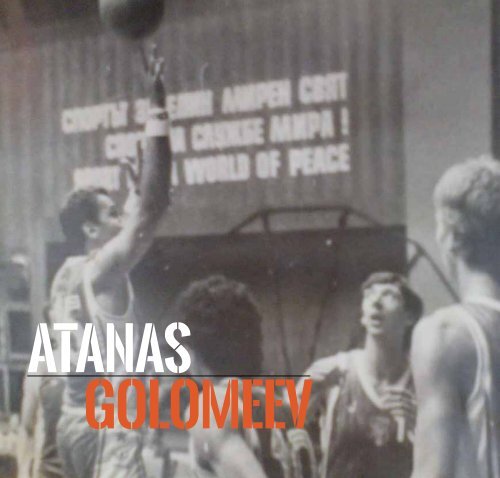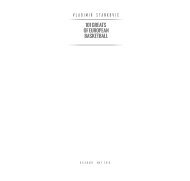ATANAS GOLOMEEV - 101 Greats of European Basketball
You also want an ePaper? Increase the reach of your titles
YUMPU automatically turns print PDFs into web optimized ePapers that Google loves.
Atanas<br />
Golomeev<br />
135
Bulgarian legend<br />
In the second edition <strong>of</strong> the U18 <strong>European</strong> Championship,<br />
played in Italy in 1966, a lot <strong>of</strong> future stars<br />
emerged: Dino Meneghin, Marino Zanatta and<br />
Giulio Iellini <strong>of</strong> Italy; Kresimir Cosic, Damir Solman,<br />
Ljubodrag Simonovic and Aljosa Zorga <strong>of</strong> Yugoslavia,<br />
who would become the 1970 world champion;<br />
Zdenek Dousa <strong>of</strong> Czechoslovakia and Aleksandar<br />
Boloshev <strong>of</strong> Russia. However, the top scorer <strong>of</strong> the<br />
competition was from Bulgaria.<br />
His name was Atanas Golomeev, who was born in<br />
S<strong>of</strong>ia on July 5, 1947. He averaged 17.6 points, including<br />
34 points against France and 32 against Spain. Only<br />
two years later, at 19 years old, he made his debut in the<br />
senior EuroBasket in Naples and his 5.5-point average<br />
didn’t hint at a future scoring champ. However, at the<br />
1971 EuroBasket in Germany, Golomeev was already<br />
averaging 18.6 points. And by the 1973 EuroBasket in<br />
Barcelona, he was the top scorer, with 22.3 points per<br />
game, above Wayne Brabender, Sergei Belov, Tal Brody,<br />
Jiri Zidek, Kresimir Cosic and Modestas Paulauskas.<br />
Golomeev also made the all-tournament team with<br />
Nino Buscató and Brabender <strong>of</strong> Spain, Belov <strong>of</strong> the USSR<br />
and Cosic <strong>of</strong> Yugoslavia. As a man <strong>of</strong> habit, Golomeev<br />
also became the top scorer at the 1975 EuroBasket in<br />
Belgrade, with 23.1 points, again ahead <strong>of</strong> many superstars.<br />
In 1977, at EuroBasket in Belgium, Golomeev<br />
again scored a high average (20.1) in what was his last<br />
big competition.<br />
I was lucky to follow him live in Belgrade and Belgium<br />
and I have no doubts that he was one <strong>of</strong> the finest<br />
centers <strong>of</strong> his era. And, mind you, he was playing<br />
against Cosic, Meneghin, Zidek, Clifford Luyk, Vladimir<br />
Andreev, Vinko Jelovac, Vladimir Tkachenko, Alexander<br />
Belostenny and others. It’s funny that Golomeev<br />
was shorter, standing at 2.02 meters, more <strong>of</strong> a power<br />
forward than a center. But thanks to his physique and<br />
especially the needs <strong>of</strong> his teams, he normally played<br />
at the center position. He had good rebounding skills<br />
and a sixth sense <strong>of</strong> knowing where the ball would fall,<br />
making up for his lack <strong>of</strong> centimeters.<br />
This was a brief history <strong>of</strong> the appearances in<br />
EuroBasket <strong>of</strong> one <strong>of</strong> the best Bulgarian players ever.<br />
However, his complete story, both personal and pr<strong>of</strong>essional,<br />
qualify him to belong in this series dedicated to<br />
the best players <strong>of</strong> the past.<br />
It all started with the Universiada World University<br />
Summer Games played in 1961 in S<strong>of</strong>ia. Atanas Golomeev,<br />
“Nasko” to his friends, received by chance some<br />
free tickets to go see the basketball tournament. As<br />
he said, he fell in love with the game by watching the<br />
attractive Brazilian players and the better Bulgarian<br />
players like Ljubomir Panov and Viktor Radev. The man<br />
who discovered Golomeev’s talent in 1964 at the Todro<br />
Minkov school was Ventsi Yanev. Nasko was a natural<br />
born talent for many sports. He was a goalkeeper on<br />
the school football team, in athletics he did the high<br />
jump and discus. He was also a good swimmer, but Yanev<br />
saw clearly that Golomeev had been born for basketball.<br />
He took Golomeev to the Spartak school and<br />
then he signed for CSKA S<strong>of</strong>ia at 18 years old, while in<br />
the military service.<br />
Explosion in ... Canada<br />
At 20 years old, Golomeev already stood out, but<br />
who knows how his career would have evolved if his<br />
father had not been sent to Montreal, Canada as a rep-<br />
<strong>101</strong> greats <strong>of</strong> european basketball<br />
Atanas Golomeev<br />
G
Vladimir Stankovic<br />
resentative <strong>of</strong> the Chamber <strong>of</strong> Commerce <strong>of</strong> Bulgaria.<br />
Golomeev studied at the prestigious McGill College,<br />
founded in 1821, and he quickly earned a reputation as<br />
the best player on the basketball team.<br />
“They called me last year,” Golomeev recalled a few<br />
years ago from Torremolinos, Spain, where he spends<br />
his winters playing golf. “On April 12, they wanted to<br />
celebrate something because some <strong>of</strong> my records are<br />
still standing after 35 years! My average <strong>of</strong> 37.5 points<br />
is still untouchable, as well as the 57 points I scored<br />
in a game that we played as visitors. Such a shame I<br />
couldn’t make it, but I am happy that they still remember<br />
me.”<br />
His games at McGill caught the attention <strong>of</strong> several<br />
NBA teams, specifically New York, who was seriously<br />
interested in signing the Bulgarian player. But the idea<br />
<strong>of</strong> becoming a pr<strong>of</strong>essional basketball player never,<br />
ever crossed Golomeev’s mind. Interestingly, another<br />
Bulgarian, Georgi Glouchkov, became the first <strong>European</strong><br />
player ever in the NBA, in 1986. But that’s another<br />
story. It was almost impossible for Golomeev due to<br />
the nature <strong>of</strong> his father’s job and because <strong>of</strong> the rules<br />
back then. The Bulgarian federation would never have<br />
granted him permission to play in the NBA because<br />
that would have meant that Golomeev could no longer<br />
participate in the national team.<br />
He chose to go back home, but this time he signed<br />
for Akademik. In the 1969-70 EuroLeague season, the<br />
Spanish giants Real Madrid saw his potential in their<br />
quarterfinals duel. Madrid won at home, 97-83, and<br />
Golomeev scored 19 points, but lost the duel against<br />
Luyk (34). However, one week later, his revenge was<br />
complete as Akademik won <strong>101</strong>-86 and Golomeev<br />
nailed 38 points!<br />
“The only thing I remember from that game was the<br />
helplessness <strong>of</strong> my players in trying to stop Golomeev,”<br />
Pedro Ferrandiz, the legendary Real Madrid coach, told<br />
me once. “He scored when and how he wanted. He beat<br />
us by himself. He was a false five, he lacked height, but<br />
he had great technique and great shooting. Yes, he was<br />
a great player.”<br />
After six years with Akademik, from 1970 to 1976,<br />
Golomeev signed for Levski-Spartak, where he played<br />
until 1981. In a game against Slavia S<strong>of</strong>ia, he scored 63<br />
points, the standing record in Bulgaria. He was a fighter<br />
willing to battle against anybody to win. He had the reputation<br />
<strong>of</strong> having a bad attitude because <strong>of</strong> his constant<br />
replies to referees on the court, and he was called for<br />
many technical fouls. But outside the court Golomeev<br />
was kind and well-mannered. At 34 years old, he entered<br />
the Bulgarian history books as the first player ever with<br />
legal permission to play abroad. He signed for Adana <strong>of</strong><br />
Turkey, who had just won the second division. Of course,<br />
he was the best scorer in the league, and teams like<br />
Efes Pilsen, Fenerbahce and Besiktas lost in Adana that<br />
season. There is no reliable data about his averages,<br />
but Golomeev says that he hardly ever scored less than<br />
30 points. It was just not fair that such a great player as<br />
Golomeev never had the chance to play for a great <strong>European</strong><br />
club. But life isn’t always fair.<br />
After his great performance at the 1973 EuroBasket<br />
in Barcelona, rumor had it that Golomeev had an <strong>of</strong>fer<br />
to play in Spain. In an interview published in “Rebote”<br />
magazine in Barcelona after the tourney, Golomeev<br />
himself said that “two Spanish teams wanted to sign<br />
me”. He said he could not reveal the names, but that<br />
“one was from Catalonia”. Many years later, with a smile<br />
on his lips, he confirmed everything:<br />
“Yes, Barcelona had new directors and they wanted to<br />
136<br />
137
sign me, but it was impossible,” he said. “I was 26 years<br />
old and I wasn’t allowed to play abroad until I was 34.”<br />
In the FIBA Hall <strong>of</strong> Fame<br />
When he returned home from Turkey, Golomeev<br />
played two more years for Levski-Spartak and put an<br />
end to his career in 1985, at 38 years old. After the<br />
1987 EuroBasket in Greece, a farewell game for Atanas<br />
Golomeev was played on June 21 between Bulgaria and<br />
an all-<strong>European</strong> team with Drazen Petrovic and Stojan<br />
Vrankovic (Yugoslavia), Nikos Galis and Panagiotis<br />
Giannakis (Greece), Antonello Riva and Walter Magnifico<br />
(Italy), Mickey Berkowitz and Doron Jamchi (Israel),<br />
Richard Dacoury (France), Stanislav Kropilak (Czechoslovakia)<br />
and Rik Smits (Netherlands). The coach was<br />
Pavel Petera (Czechoslovakia) and Europe won 129-82.<br />
It was the last game <strong>of</strong> the great Atanas Golomeev.<br />
He remembers his great rivals, especially Kreso<br />
Cosic who, aside from being tall, was smart and with<br />
great court vision and great assists.<br />
When FIBA, on occasion <strong>of</strong> the basketball centennial,<br />
chose the 50 best players ever, it could not forget<br />
about Golomeev. It was a recognition for 25 years <strong>of</strong> a<br />
brilliant career that could have been even better if not<br />
for political circumstances. Golomeev was a Bulgarian<br />
club champion 12 times, 10 as a player and two as a<br />
coach. From 1991 to 1993, he was president <strong>of</strong> the<br />
Bulgarian federation. He was also a member <strong>of</strong> several<br />
FIBA committees, but his passion eventually changed<br />
from the “big ball” to the smaller one <strong>of</strong> golf.<br />
Mihail-Misha Delev, a prestigious Bulgarian journalist,<br />
together with Lilia Yankova and Hari Latifyan, wrote<br />
two volumes on the history <strong>of</strong> Bulgarian basketball and<br />
has this opinion about Golomeev:<br />
“I cannot categorically say that Golomeev was the<br />
best Bulgarian player ever, but with Ilia Mirchev, Viktor<br />
Radev and Georgi Glouchkov, he was definitely among<br />
the best four big men ever in Bulgaria. He could score<br />
with impressive ease.”<br />
<strong>101</strong> greats <strong>of</strong> european basketball<br />
Atanas Golomeev<br />
G

















